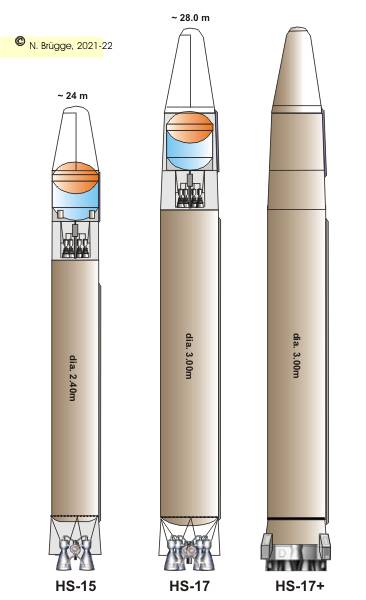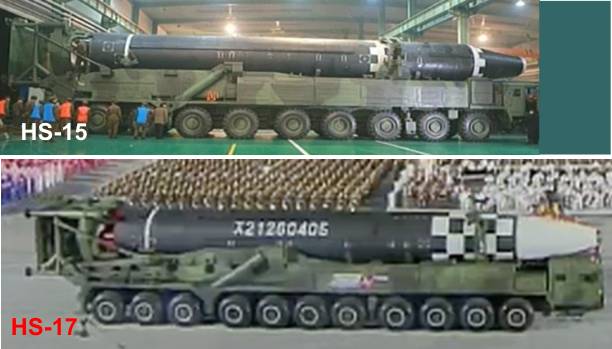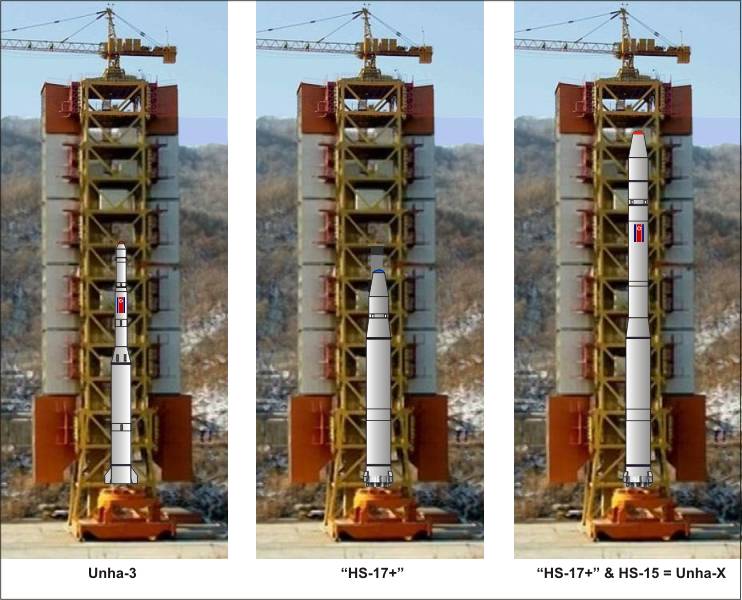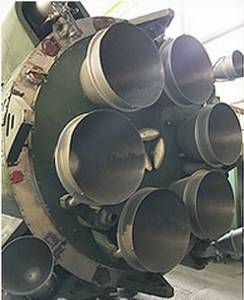|
North Korea's questionable
ICBM "Hwasong-17" (HS-17)*
Norbert Brügge, Germany
|

2022, April 25 -- The HS-17 on the parade
* 2021,
October 13 -- It is now official, the suspected HS-16 is called HS-17.
|
|
2022, November 08
-- On that day, a modified HS-17 was launched from Airort near Pyongyang.
The modifications affect both stages of the rocket. The first stage
was shortened by about 1.5 m and the second stage was lengthened by
1.5 m. The missile is called
HS-17A here.
2022, March 24 --
Eight days after the failure, another HS-17 was
successfully
launched. After the end of the burn it still reached a altitude of 6,200
km.
2022, March 16 -- There was probably a
failed launch of the HS-17
that day. Debris has fallen near Pyongyang. The failure was associated
with a huge detonation on midair.
It is possible that this failed launch was the first attempt to test
a single-stage HS-17+ with 6 engines (3x2 combustors), that use as the
first stage of the
Unha-X.
2022, March 10 -- It was reported that North Korea on
February 27 and March 5 launched unidentified missiles with components
of a reconnaissance satellite on board.
On March 10 the US reported that the new, large Hwasong-17 ICBM was
involved.
Images
released by North Korea from launch in 2022, March
|
|

|

An exact comparison is here difficult, but the difference
in diameter from 2.4 to 3.0 m can be clearly seen
|
Analysis
Like the HS-15, the Hwasong-17
is not a real ICBM. Both are the stages for the new SLV "Unha-X". The
HS-17 here has an unusually oversized fairing including the second stage,
which, like the transporter, suggests an modeling for the parade.We should
not be fooled by the details on the surface.
The HS-17 is without engines about 27.0 m long. The first stage is about
17.5 m long, with a diameter of 3.0 m. The shown mock-up has no engines.
The relevant section at the end of the rocket, which is short and slightly
conical, is covered by pots painted in red. As a result, we still do not
know how many engines the HS-17+ for Unha-X will have (probably six 3x2
combustors), the HS-17 have four (2x2 combustors).
|

|
|

|
|
|
|
2019, Dec. 13 -- "Another cruicial test was successful
conducted at the Sohae SLG from 22.41 to 22.48 on December 13. The
research successes being registered by us in defence science one after
another recently will be applied to further bolstering up the reliable
strategic nuclear deterrent of the DPRK.�
2019, Dec. 07 -- "A very important test took place at the Sohae
SLG on the afternoon of December 7. The Academy of the National Defence
Scienc of the DPRK made a report on the successful test of great significance
to the Central Commitee of the Worker's Party."
So far there is no further information or photos, but we can guess
what will happen:
The first stage of the upcoming new Unha-X SLV with 3 x 2 "Pektusan-A2"
engines was subjected to a static test for the first time. This stage
is undoubtedly usable for a real ICBM, which we will see in the near
future. Due to the dimensions of this vehicle ("HS-17+"), the pad
on the Sohae SLG probably will be use, where also the undetected static
tests took place at night.
|
|

|

This is what the HS-17+ and its rear could
look like
|
|